by Alexandra Stevenson
RESULT MIRRORS GRAND PRIX FINAL MEDALS
BIN YAO SEES A LIFETIME’S DREAM COME TRUE – TRAINS CHINA’S FIRST OLYMPIC CHAMPIONS
The last time non-Russians won the Olympic pairs event was in 1960 when Barbara Wagner and Bob Paul, Canada, won gold; Marika Kilius and Hans-Jurgen Baumler, Germany, took silver and Americans Nancy and Ron Ludington claimed the gold. There were two Russian pairs competing. Stanislav Zhuk, who became a great Soviet coach, and his sister, Nina, were sixth. Zhuk would teach Irina Rodnina, who would win three Olympic golds with two partners. The pair who would usher in this new era, Ludmila Belousova and her husband to-be, Oleg Protopopov, who now live in Lake Placid, NY, were ninth in the 1960 Olympics in a field of 13 pairs. When the Protopopovs won in 1964, in a controversial victory over Kilius and Baumler, few envisioned that country’s dominance in this Olympic discipline would not be broken for 46 years. But a fresh breeze blew in this year, with a Chinese pair coming out of a two-and-a-half year retirement to earn gold. Their teammates took silver pushing the German current world champions down to bronze. The three-time Russian champions finished fourth, a substantial 15.83 off the podium.
Xue Shen and Hongbo Zhao saw China’s flag raised to celebrate China's first-ever victory in the Olympic pairs event in Vancouver. Naturally, they were over-the-moon. Sitting on a raised dais before the world’s press, Shen said, through a translator although they both speak some English, "Words can not describe how I feel right now. This is our fourth Olympics. Twice we have won bronze (2002 & 2006). We made a come-back to give it our last shot for gold." They are only the second pair to win three successive medals in the Olympic Pairs event. Andree Joly-Brunet and Pierre Brunet of France, who later taught for many years in the United States, won their second successive Olympic gold in 1932. They had previously won bronze in 1924. (This, of course, doesn’t include Rodnina because she gained her three golds with two different partners.) At 36, Zhao is the second oldest Olympic gold medalist in any of the figure skating disciplines after the Finn, Walter Jakobsson, who was 37 when he and his wife won the pairs event in 1920. At 31, Shen is the tenth oldest person to win an Olympic gold figure skating medal.
Zhao was a seven-year old playing basketball in the street when he was recruited into by a talent scout in Harbin, a polluted city in northern China. That meant he was sent to a boarding school first in Harbin and then eventually in the capital city of Beijing, which meant his parents only rarely got to see him. They were struggling financially and so were delighted that he was in a programme which meant he would be well fed and receive a good education. He eventually graduated to become part of Bin Yao’s master classes.
Bin Yao and his partner Bo Luan literally developed pair skating in China. What a wonderful crowning moment it was for the 52 year old Bin to see that he had accomplished his life’s ambition, to train skaters who earned the ultimate accolade. When he and his partner started, they had no knowledge of skating from outside their country. At first, they would put a table on the outdoor ice to practice lifts. They had magazine photographs of skaters in beautiful posed positions, but no film. It was easy to get down from lifts but they couldn’t figure out how to get up. Occasionally they would journey as close as they were allowed to the Soviet border to catch skating transmissions from Soviet television trying to glean any tidbit of knowledge they could. When they finished last in their world championship debut in 1980 in Germany, they felt they were being laughing at because their standard was so low. In fact, journalists voted for Bo for the prize as the most charming skater.
Shen and Zhao teamed up in 1992, after Zhao had already won the national title with another skater. Their start was tentative and they finished 21st out of 24 in their first Worlds in 1994 in Tokyo. They weren’t entered the following year, but in the 1996 Worlds, in Edmonton, they began their rise, placing 15th. The next year they were 11th and then 4th in 1998. They were a disappointing fifth in the Nagano Olympics that year but in 1999 and 2000 they won the World silvers and then bronze in 2001. After winning bronze behind the double Olympic gold medalists in Salt Lake City in 2002, they won the world title in Nagano 2002 and then gave one of skating history’s most fantastic free skate showings to retain that title in 2003 in Washington DC despite her injured ankle.
They had to be content with silver in the 2004 Worlds. Then Zhao tore his Archilles Tendon which forced them to withdraw from the 2005 Worlds. He reinjured the Tendon and the required surgery made it unlikely they could compete again. But he fought back and in 2006 they won their second Olympic bronze. They did not go to the subsequent Worlds and were presumed to have retired. But, they returned and won their third world title in March 2007. After that Free Skate in Tokyo, when their music finished, Zhao dropped to one knee to propose. Shen, not understanding what was happened, followed his example, and also got down on one knee. The stadium erupted with huge cheering.
Initially, the pair settled down to teach skating coaches in a brand new facility in Shenzhen, but offers from ice shows, which were too good to ignore, poured in. He explained, "During that time, we learned to perform more for the audience and I think we developed our artistry. We became stronger in that area." It was Zhao’s idea to return to competition. He said, "Getting back into competitive shape was hard, so hard. After the first enthusiasm, I began to realize how much of a task we had undertaken. My body seemed to tell me, I could no longer do it. But we persevered. We had this dream. I feel like I am in a dream. When our music finished today, I said, 'Thank you, wife.' We have dreamed of winning this gold for years and years."
Because ISU world standings depend on results achieved in the past two seasons, they were the bottom on the list of the 20 pairs from 12 countries, which meant they were relegated to the first group of four pairs to skate. They drew to skate first of these four and performed brilliantly, if a little carefully, to Brian May’s Who Wants to Live Forever. They were so good, they overshadowed the first few pairs making for an anticlimactic start. One judge gave them the maximum +3 Grade of Execution for their first three elements, their side by side triple toe loop jumps, the Level 1 triple Lutz twist and the throw triple loop. Although we know who officiated on the judging panel, we don’t know which judge that was but he or she was backed up by others on the panel. One gave a +3 for the toe loops. Another punched in a +3 for the twist and two others thought the throw worthy of this maximum accolade. For the rest of the moves, the judges gave +2 and +1. They earned Level 4 for their solo flying combination spin, their Group 4 lift and the pair combination spin. The last two required elements, straight line steps and back outside death spiral were Level 4. They performed at 4:30 pm and the final pair, Germany’s Aliona Savchenko and Robin Szolkowy, finished skating at 7:55pm. Asked how they felt about waiting so long to find out their placing, Zhao graciously said, "It was a pleasure. I enjoyed watching every other competitor." Their score of 76.66 is a world record. Asked what he thought of that achievement, Zhao said, "Today is Valentine’s Day and the first day of the Chinese New Year. It is a wonderful present for us."
Savchenko and Szolkowy presented their poignant Send in the Clowns routine. Four of the nine judges thought their opening move, the throw triple flip was worthy of +3, while the others punched in +2, so they beat Shen and Zhao on that element gaining 7.14 points to Shen and Zhao’s 6.52. But the Chinese earned more (5.80) than the Germans’ (5.20) for their triple toe loops. The Chinese also were ahead on the twists earning 6.24 to the Germans’ 5.84. The Germans, however, were awarded one more Level 4 (for their back outside death spiral) than the Chinese. The Chinese were marginally ahead of the Germans in both the technical score, 42.42 to 42.24, and the components 34.24 to 33.72 which gave them a lead of 0.70 over Savchenko and Szolkowy going into the free.
China’s Qing Pang and Jian Tong were initially in fourth place, 2.66 behind the third-placed Russians, Yuko Kavaguti and Alexander Smirnov. Pang and Tong received only Level 1 for their back outside death spiral in both SP and FS. In the SP, they also were saddled with a point deduction time violation. The 2006 world champions, who are both 30, performed to Bizet’s The Pearl Fishers. "We’re had some health issues," said Tong. "I’ve been sick with a cold and I gave it to Qing and she gave it back to me. But now we are fine." In the Free Skate Pang and Tong skated next to last, with only Shen and Zhao still to come. They chose the music Beatrix Schuba used to win her 1972 Olympic gold, The Impossible Dream from Man of La Mancha and gave their best ever showing at the most important time of their career. They were sheer athletic perfection teamed with a choreographic genius. Not a finger was out of place in the four minutes and forty second routine. Both throws, triple Salchow and loop, were executed back to back and had the audience gasping in awe. They finished with two lifts which caused the arena to explode into applause and lifted the audience to the feet. At the end, Tong knelt down and kissed the ice. "I don’t know what made me do that," he said later. "A power just took over. Today, China has proved it is a force in figure skating."
It must have been incredibly difficult for Shen and Zhao to follow that. Shen explained, "Before we set foot on the ice, we saw that they had just finished a great programme and I thought that is the signal that we, too, must give all we had." Skating to Albinoni’s Adagio, they couldn’t match their younger colleagues’ technical wizardry. Almost all their elements were performed well but Shen collapsed during their Lasso lift, although they did their best to disguise the error. The judges gave them a 1.12 greater component score, but technically they got 1.90 less. That gave Pang and Tong first place in this section, pulling them up to earn silver, 3.26 points behind their comrades. (All three Chinese pairs are from Harbin in the north of China.) Asked what it meant to break the Russian dominance in pair skating which started in 1964, Hongbo said, "My belief is that all records are made to be broken." Shen, clearly showing the influence touring in North America has had on her, saying, "Mom! Dad! Look! It’s a gold one – fresh out of the oven!" Her husband added, "We're very happy today, of course. This is a dream come true. We have had this dream for many, many years. We have won many competitions, but every time we saw our flag rise and heard our national anthem, we wished it was the Olympic Games. The Olympic gold medal is the ultimate dream of our career." Of course, now comes the question, who will continue to Worlds in Torino? Zhao was pushed into saying, "We are too old to continue skating, so maybe it’s time to have a baby."
Savchenko and Szolkowy tried to put on a good face but were obviously disappointed with bronze. Their routine, set to music from the film, Out of Africa, got off to a bad start when she doubled the second jump in their planned sequence of two triple toe loops. They had initially planned to execute triple Salchows later in the routine but their coach, Ingo Steuer, decided to change that element to side-by-side double Axels because Savchenko had been having trouble with it. But though she landed her double Axel, Szolkowy fell. They finished 2.71 points behind silver and 5.97 behind gold. "Maybe tomorrow we will look at our medals and be pleased," said Szolkowy, "But that is hard to do at now." Coach Steuer pointed out they have never before lost in Canada. They gained their first win at the 2005 Grand Prix in Canada and received the world’s first ever award of 10 for a component mark when winning this season’s Skate Canada. However, recently, they have struggled, starting the season badly with a bronze in the Paris Grand Prix, and also gaining only bronze in the Grand Prix Final Tokyo. Particularly upsetting was losing the European title which they had won three times to Yamaguti and Smirnov in Tallinn. The day after the long in Vancouver, their coach, Ingo Steuer, put them on a flight back to Germany. They will fly back for the Exhibition program next week but they have to prepare new routines for a series of exhibitions for Art on Ice. As of now, they are expecting to defend their world title in Torino.
Also disappointed were Yuko Kavaguti and Alexander Smirnov, the three-time Russian champions who recently dethroned Savchenko and Szolkowy in the European championships. They lay third after showing an extremely balletic interpretation of Camille Saint Saens’ The Swan. They were presented with the fourth highest technical score in the SP (0.16 behind Dan Zhang and Hao Zhang, who were only fifth in the SP) and the third highest components to lie 1.8 points behind the Germans and a comfortable 3.66 points ahead of Pang and Tong. After the SP, Kavaguti said they were going for dinner and then they would decided whether she would try the throw quad Salchow in the FS, hoping that could bring them gold. But she looked extremely nervous in the warm up for the FS.They skated first of the top four pairs to Valse Sentimental and The Blue Danube. The throw was their first move. They clearly had enough airtime for her to complete the four revolutions. Coming out after three seemed to throw her off. She did not fall but the landing was bad, and their spirit seemed to evaporate. They were seventh in the Free Skate but dropped only one place to fourth. However, they were a chasm of 15.83 points behind the bronze medalists and only 0.43 ahead of the Zhangs. Kavaguti said, "We tried to do our best performance but there was too much stress. We were aiming for a quad but only did a triple." Smirnov said, "The Olympics feel very different from other competitions I’ve been in." Kavaguti initially sought Moskvina out, traveling from Japan to New Jersey, because she wanted to skate "like Elena Berezhnaya" and Moskvina took her through several partners.
It is impossible to forget the horrifying fall by Dan Zhang when an attempted quad throw went wrong in the 2006 Olympics. She recovered and, with Hao Zhang, who is not a relative, won silver. Much discussion was made about the time allowed for her to recover. That led to much stricter rules being instigated for a stoppage in which the skater must continue or withdraw. A penalty is also now applied. After the SP, they were fifth only a minuscule 0.22 behind their teammates, Pang and Tong. In the free, he fell on the second jump of their opening move, a sequence of double Axel to triple toe, which took them out of medal contention. They were only 0.43 from fourth place overall. He said, "I am shattered. Maybe I fell because I was too close to the wall. But we have practiced this many times during training. I can’t believe that I failed at such a high level competition."
Sixth throughout the competition were Jessica Dube and Byrce Davison, who teamed up in 2003. They are also remembered for a spectacular accident which happened during Skate America in Colorado Springs three years ago when his skate caught her in the cheekbone during side-by-side flying camel spins. Amazingly, it didn’t dampen their enthusiasm for the sport. Unfortunately, the 2008 world bronze medalists, two-time and reigning Canadian champions had flaws. Dube, 22, fell on her triple Salchow in both short and long programs. After the SP, she and her partner, Byrce Davison, 24, were a considerable 5.92 behind the Zhangs and just 1.16 ahead of their teammates, Anabelle Langlois and Cody Hay, who lay seventh. Bryce, 24, explained, "The jump’s more of a mental thing. When you see the replays, the rotations were both there. With a little (quicker) reaction time, a little more confidence, she could have had them." Davison said, "When the Sal happened, we just got a little bit out of our skates. And I messed up our side-by-side spin, which is ridiculous, and then after that, we were a little bit all over the place. We’re not completely satisfied with how we skated that one, that's for sure." They were 10th in their first Olympics in Torino. Dube said, "This is way bigger than Torino. There’s so much attention on us."
For the FS, they performed to Marvin Hamlisch’s music from the movieThe Way We Were, wearing very plain outfits, she in a grey dress, he in a cotton white sweater and casual slacks. Davison said the routine told a story which was very similar to their own. "Like in the movie, two people fall in love. It doesn't end up working out and there’s the famous scene of walking away from each other. That's kind of been Jess and my story. It's such an easy story for us to tell, because we've lived most of it, on the emotional side of things. We look back at it and we don't just see the negative points of the program. We see that we did some really good things. We're not devastated about it but we look forward to Worlds next month, and doing a lot better there. Good skates happen. Bad skates happen. But life goes on. There's more to us than skating. We still don't have an Olympic medal, so our job's not done. People are going to skate clean programme and, if you want to be on the top, that’s what you have to do."
Maria Mukhortova and Maxim Trankov of Russia rose from eighth after the SP, in which he fell on their triple toe loop, to seventh overall with a FS which was judged fifth best. She said, "This is our first Olympics so it’s given us experience. I think the audience was warm and the judges were fair. We received the score we deserve. We’ve made a lot of progress in the past three years." He said, "It was hard to skate today because of my fall yesterday. I was under a lot of pressure. I’m happy it’s over because of the pressure."
Tatiana Volosozhar and Stanislav Morozov of Ukraine, who train in Germany, rose a place from ninth with a routine which was ranked eighth best despite a fall by Morozov on his triple Salchow. Volovsozhar said, "Stanislav is one of the only male skaters who can do a one handed entry to a lift. He is reliable and strong and to turn with one hard, not many skaters can do that. This will be our last Games."
An ankle injury kept Anabelle Langlois, 28 & 4’11", and partner Cody Hay, 26 & 6’0", who were the 2008 Canadian champions, off the ice for the entire 2008-9 season so it’s been a long, hard road to make the Olympic team. They are an unlikely duo. She had Olympic experience, finishing 12th in Salt Lake City with her previous partner. They finished fifth in the 2003 Worlds so, after that teaming dissolved, it was a surprise when she teamed up with Hay, who was a junior. But the match turned out well. Hay was the only person on Canada's Olympic team to be born in this province of British Columbia (in Dawson Creek).They performed a great SP to Fascination, a romantic waltz by Filippo Marchetti, landing their triple toe loops and an impressive throw triple Lutz. Hay explained, "It was one of the biggest throws of my life and to hear the crowd like that, it made my legs go to jelly." She said, "When you get to the Games, just the energy and being amazed with everything is incredible. If it doesn't overwhelm you, it's great." Hay explained, "I'm more relaxed and laid-back while Anabelle is a lot more fiery and intense. I think the balance really works. She helps to push me and I help sometimes to just take her down a notch or two when it needs to happen." After performing cleanly with great energy and audience appeal in the SP, their FS, to Sunset from Grand Canyon Suite, was disappointing. Langlois fell hard on a side-by-side triple Salchow early in the program. She explained, "It's hard to start out a program with a fall. I was so surprised. I thought I had it. Next time, I'll wait a bit before I celebrate." Later, she put a hand down on a throw triple Lutz. They dropped from seventh overall to ninth.
"Rookies", Amanda Evora, 25, and Mark Ladwig, 29, who teamed up in 2002, gave two of the best showing of their lives. They performed to the Portugese Love Theme from Love Actually by Craig Armstrone, and their FS used Rachmaninov’s Piano Concerto No. 2 in C Minor. They were tenth throughout. It was their first time in the "big" time. It was not the only Olympics Ladwig had attended, however. He was a volunteer in 2002 in Salt Lake City. Though they have skated together for eight years, they had not previously placed higher than fourth at nationals so were never on the world championships team. Tenth is the lowest finishing position ever for the top-ranked U.S. team at the Winter Olympics, but the sport has become more competitive with a lot more countries participating in the discipline. The last US pairs medal in a Winter Olympic Games was silver in 1984, claimed by Kitty Carruthers Conrad, who now lives in Houston, and brother Peter Carruthers. Evora said, "We had no expectations. We knew that we skated a great short. We wanted to stay in the top 10, and I put more pressure on myself than I probably should have. It's nice that we've been together for eight years, but look at how long the Chinese have been together. It's an inspiration for me to see that Olympic champions made a lifetime of sacrifice and hard work and got where they are today."
Lyndon Johnston, who trains both US pairs at this event, represented Canada in the 1984 Winter Olympics. He said both teams aspire to display the maturity that carried the top couples to the medals podium. "I retired at 28, and now I look at teams like Xue and Zhao, and he's 36! I wish I had that mentality. At 28, people were telling me, ‘Gosh, you're old!’ Twenty-eight is nothing now. You can do really, really well in this sport in your 30s, and they've shown that." He also said that Evora and Ladwig both improved this season on jumps. "This is the first year Amanda has been given credit for her triple jumps. They worked hard for many years, but people would say ‘great team, can't jump.' You can't land them all, but you can do the correct technique all the time. When they look at the teams ahead of them and see how long they've been around on the international scene, the amazing part is the longevity of those mature teams." Ladwig said that earning two season-high scores at the Winter Olympics, he and Evora have ample motivation to work. "That is what the new scoring system is about. It lets you set a bar and say ‘we're going to beat that score.' When we sat down with U.S. Figure Skating, they said we had to show that we will make our elements and do jumps to satisfy the system. Now, we know what we're up against. We can go home and work on that and elevate our performances."
US Champions, Caydee Denney,16, and Jeremy Barrett, 25, are only in their second season of competition. They lay 14th after their SP, set to Stravinski’s Firebird. Twelfth place in the FS, which they performed to Sheherazade, brought them up a place to 13th overall. While Denney executed the triple toe loop that she had doubled on in the SP, the element was downgraded. She also singled a double axel early in the program. He said, "I think we've made a huge improvement since the last year, but we still have a ways to go." She said, "Two years ago, I wasn't even really thinking about skating pairs, let alone being here. I've been doing this for 18 months, and it's been quite an incredible journey. To be here and experience what I just experienced at 16 was a lot of fun and amazing. I was really excited to get ready to start. The easy part is once the music starts, that's when you feel fine. It was just a lot of fun out there. The atmosphere that the crowd gave us was amazing." He said, "It wasn’t about being perfect. We just wanted to show the world what we had. We’re looking forward to going to Worlds." The pairs executed their SP on Valentine’s Day. Barrett’s sweetheart is Evora but they put romance on hold this year. "We were both doing what we loved to do, skating. We’ll have a romantic dinner on another date. This is just too important for both of us."
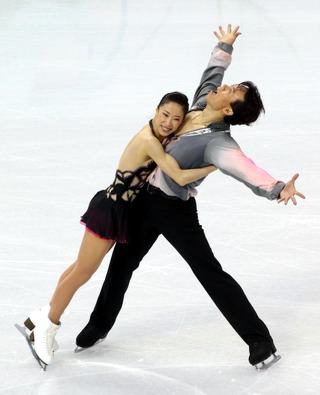 |
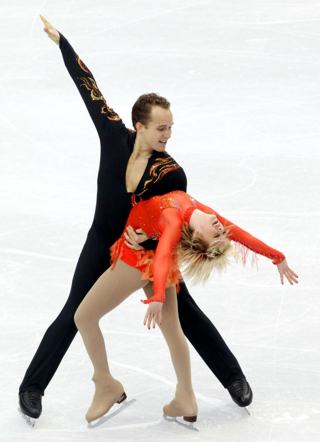 |
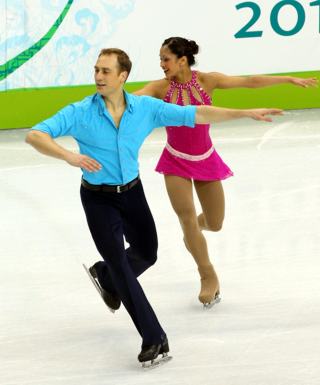 |
| Shen & Zhao -- First | Denney & Barrett | Evora & Ladwig |
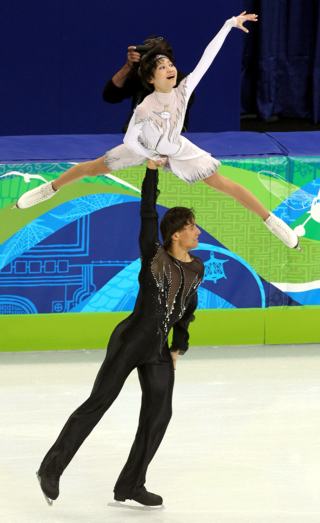 |
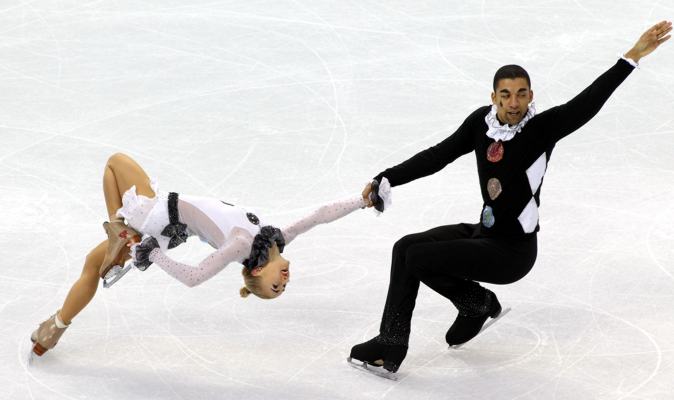 |
|
| Kavaguti & Smirnov -- Third | Savchenko & Solkowy -- Second | |
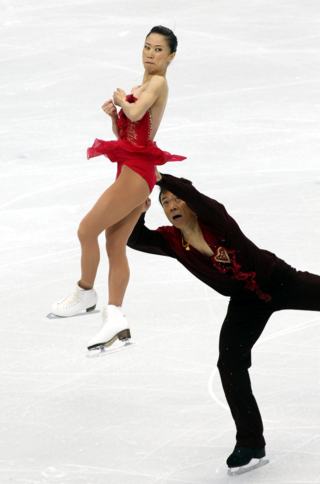 |
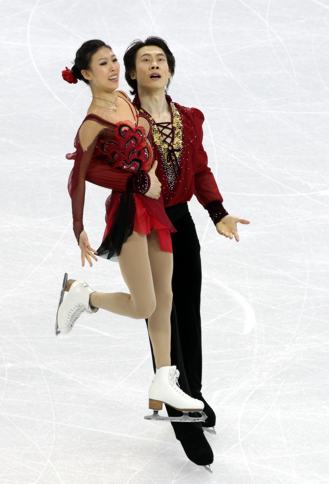 |
|
| Shen & Zhao -- Gold | Pang & Tong -- Silver | Savchenko & Szolkowy -- Bronze |
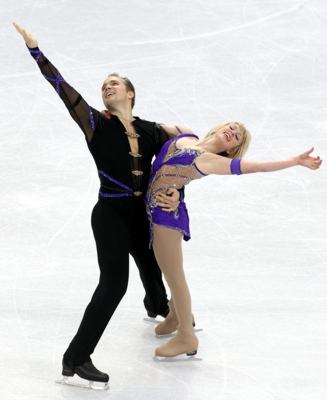 |
|
|
| Denney & Barrett |
Evora & Ladwig |
|